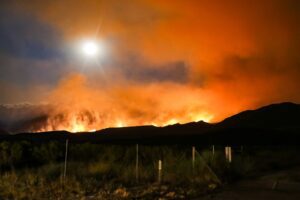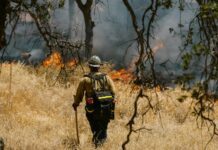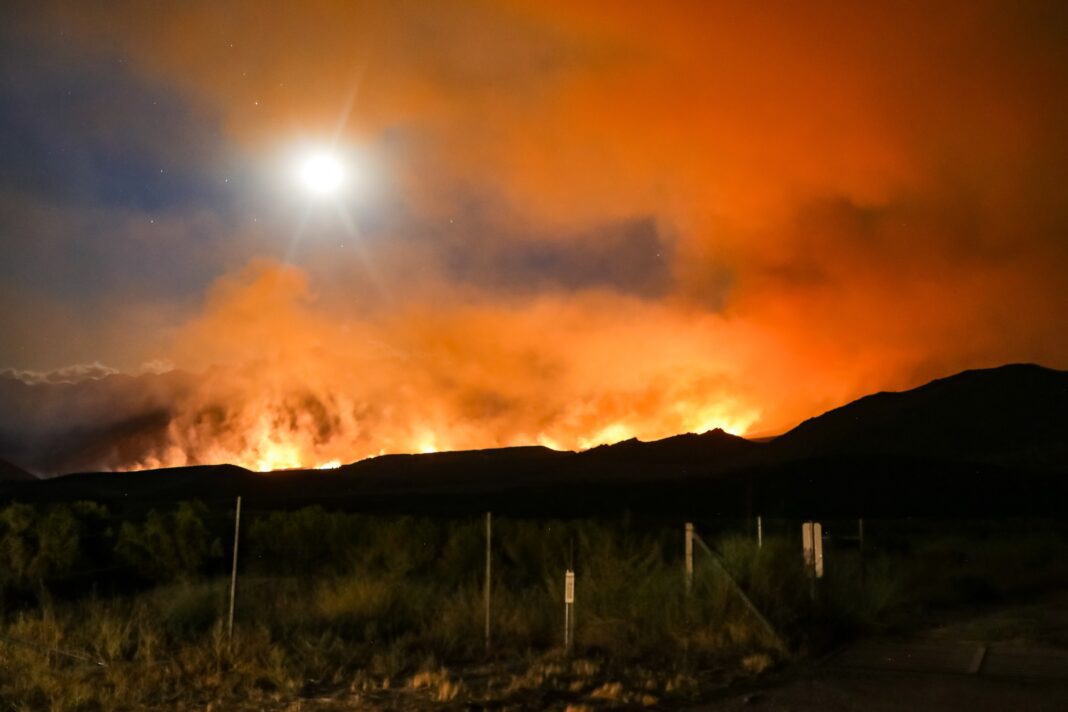A fire dubbed the Newell Road Fire grew to more than 50,000 acres in Klickitat County, Washington as of Sunday, July 23.
Local fire officials have declared this a “Level 3 – Go Now evacuation order for certain areas of the county. Levels 1 and 2 have also been declared for other regions. There is a community Facebook page where residents can learn more about the evacuation orders in their specific neighborhoods.

The fire began before 3 pm on Friday, July 21 in an area near Newell Road and Dot Road. It spread over the next few hours, going in multiple directions. In the path of this fire sits homes, farm buildings, crops, solar farms, wind farms, livestock and more.
Two very prominent structures are also in danger, the Williams Natural Gas Pipeline and the Roosevelt Landfill. Obviously, a gas line in the route of the fire creates a hugely dangerous situation for anyone near the blaze.
By 10 pm Friday, a state of emergency had been declared for the county by the Board of Commissioners. By 9 am Saturday, the fire was 0% contained and had destroyed numerous structures.
“The Newell Road Fire is burning out of control and we’re concerned about danger to the residents,” said Klickitat fire attorney Gerald Singleton. “We are hoping everyone is evacuating quickly and safely and that there is no loss of life. Our hearts also go out to the firefighters and other first responders who will be battling the blaze and trying to save lives.”
If you or someone you know has been injured or had their property destroyed by a wildfire, contact the Klickitat fire attorneys at Singleton Schreiber by calling 509-516-2217 or by emailing info@singletonschreiber.com.
Newell Road Fire Destroys Structures in Klickitat and Bickleton Counties
The fire is impacting two counties, Bickleton and Klickitat, a largely agricultural area. Dotted with various types of farms and agricultural communities, these areas may have residents who are isolated and in danger of being exposed to hazardous smoke and flames.
According to the Yakima Herald-Republic, numerous structures were lost and several roads were closed, including Roosevelt Grade Road, Middle Road, Old Highway 8 North and Dot Road.
The State of Washington, renowned for its lush green forests and breathtaking landscapes, also faces a recurring and menacing natural disaster: wildfires. These destructive infernos have become an increasingly prominent threat in recent years, causing widespread devastation to both the environment and communities across the state.
Washington’s wildfire season typically spans from late spring to early autumn when dry and hot conditions create a combustible environment. While wildfires are a natural part of many ecosystems, human activities, such as careless burning, unattended campfires, and the use of heavy machinery near flammable vegetation, significantly contribute to their frequency and intensity.
Washington’s geography also contributes to the severity of wildfires. Vast stretches of forested land, particularly in the eastern and central parts of the state, provide ample fuel for the fires to consume. Dense forests and rugged terrains often make access challenging for firefighting crews, delaying response times and allowing fires to grow unchecked.
The impact of wildfires on Washington’s environment is profound. Valuable ecosystems are destroyed, threatening the survival of numerous plant and animal species. The loss of forests also leads to soil erosion, affecting water quality and contributing to increased flooding and landslides.
Furthermore, wildfires take a toll on human lives and property. Evacuations become a common occurrence during fire seasons, displacing residents and straining local resources. Homes, businesses, and infrastructure are at risk, causing significant financial burdens on communities.
To combat this persistent threat, Washington has invested heavily in wildfire prevention, detection, and firefighting efforts. Collaborative strategies between state and federal agencies, local fire departments, and community initiatives aim to mitigate the impact of wildfires through early detection, rapid response, and public awareness campaigns.
Wildfires in the State of Washington pose an ongoing and formidable challenge. These fires continue to test the resilience of both the environment and its inhabitants.
“Anyone who has been evacuated, whose property has been damaged or who has been injured in a wildfire needs to contact a qualified wildfire attorney to discuss compensation for their loss,” Mr. Singleton added. “Qualified attorneys will investigate the cause of this fire and determine who (if anyone) to hold accountable.”
Residents, business owners and anyone impacted by the Newell Road Fire should contact the attorneys at Singleton Schreiber by calling 509-516-2217 or by emailing info@singletonschreiber.com.


































